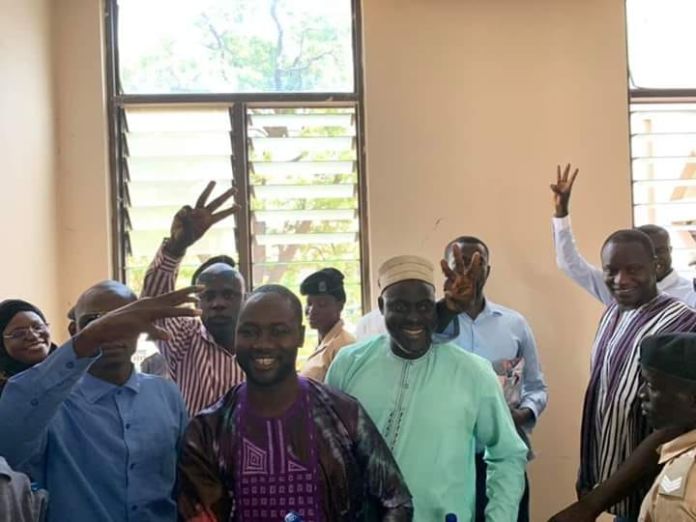By Adama Makasuba
Presiding judge Amina Saho Ceesay on Tuesday adjourned the bail application hearing of nine leaders of Three Years Jotna to Friday after lawyers on both sides sparred over bail. The number rose to nine after Bakary Camara alias Camaraba joined the seven men and one woman.
And when the case was called, lead counsel for three years leaders, Rachael Y Mendy informed the court they have filed a 26- paragraphed affidavit in support of their bail application, adding the four-paragraph affidavit in opposition by the prosecution is defective because it contravenes Schedule One of the Evidence Act which according to her is a mandatory provision.
She averred that the prosecuting is conceding to their bail application as she told the court that there is nothing in the affidavit in opposition to their bail application that mentioned that the prosecution is objecting to the application.
“There is nothing in the affidavit in opposition denying the averments in our affidavit in opposition. The State is deemed to have admitted all the averments in the affidavit in support,” she said.
She said the last paragraph of the affidavit in opposition by the prosecution, paragraph four, it is mentioned that the bail application has been overtaken by events, saying “the averment that the bail application has been overtaken by events has no basis in law.”
She submitted that once a person is in custody, he or she can bring as many bail applications as possible irrespective of what stage the proceedings is. She told the court the averment by the prosecution does not mean they are opposing to the bail application. She urged the court to grant the accused persons bail saying there is nothing in the prosecution’s affidavit that opposed bail and therefore, they are conceding.
She submitted that the accused persons are presumed innocent until they are proven guilty and the burden of proving that the accused persons are not entitled to bail is on the prosecution.
“The prosecution in this case have failed to discharge that threshold. They have failed to provide this honourable court any fact or evidence which will convince this honourable court to refuse bail,” she said.
She said there is no formal indictment before the court. She said the purported indictment by the prosecution has not been given effect by the court as required by sections 115 and 116 of the Evidence Act. She said the two sections of the Evidence Act provide that indictments should be certified. She said once a document is filed and certified, it becomes a public document and it is from there the court can give effect to it.
In a counter argument, Lawyer Patrick Gomez who leads the prosecution team for the State said it is their position that the affidavit that they have filed did not violate paragraph seven of the First Schedule of the Evidence Act 1994. He told the court that their affidavit was signed and sworn to by a commissioner of oaths. In countering Lawyer Mendy’s submission, Lawyer Gomez said there is no requirement in law that the signature of the Commissioner of Oaths to be on the left side of the paper.
He said the defence argument that their affidavit was defective was inaccurate adding that even if it is defective, the court can still allow it as he relied on sections 87 and 88 of the Evidence Act. He said there is no argument from the defence that the affidavit was sworn to before a person duly authorised.
He said the law governing affidavit in opposition is clear in our jurisdiction. He added that it is settled that even a party did not file an affidavit in opposition does not in itself means that the party is conceding to the application.
He said averment four of the affidavit in opposition is sufficient to tell that they are opposing the bail application.
However, in defense argument second lead counsel Lawyer Lamin S. Camara said the application for bail was premised on sections 19 (5) and 24 of the Constitution as well as section 99 (1) of the Criminal Procedure Code. He said the 1997 Constitution provides for the protection of liberty and dignity of people.
“One of the cardinal principles of our criminal justice system is the presumption of innocence regardless of the indictment before any court. This cardinal principle is enshrined in section 24 (3) of the Constitution. The presumption of innocence is only taken away when it is rebutted and upon conviction,” he said.




